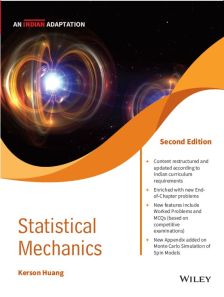Statistical Mechanics, 2ed, (An Indian Adaptation)
ISBN: 9789354247736
576 pages
For more information write to us at: acadmktg@wiley.com

Description
Statistical Mechanics by Kerson Huang is a comprehensive textbook on the framework of statistical mechanics, in which the macroscopic thermodynamic behavior of complex systems is explained by the application of probability and statistics to the dynamics of their microscopic constituents. The book is directed mainly at advanced undergraduate physics majors, graduate students in physics, as well as researchers in the field. This adaptation of the second edition of the textbook is a revision that has been developed from detailed feedback obtained from long-standing users in India.
Part A Thermodynamics and Kinetic Theory
Chapter 1 Review of The Laws of Thermodynamics
1.1 Preliminaries
1.2 The First Law of Thermodynamics
1.3 The Second Law of Thermodynamics
1.4 Entropy
1.5 Some Immediate Consequences of the Second Law
1.6 Thermodynamic Potentials
1.7 The Third Law of Thermodynamics
1.8 Worked Problems
Chapter 2 Some Applications of Thermodynamics
2.1 Thermodynamic Description of Phase Transitions
2.2 Surface Effects in Condensation
2.3 Van Der Waals Equation of State
2.4 Osmotic Pressure
2.5 The Limit of Thermodynamics
2.6 Worked Problems
Chapter 3 The Problem of Kinetic Theory
3.1 Formulation of the Problem
3.2 Binary Collisions
3.3 The Boltzmann Transport Equation
3.4 The Gibbsian Ensemble
3.5 Worked Problems
Chapter 4 The Equilibrium State of A Dilute Gas
4.1 Boltzmann’s H Theorem
4.2 The Maxwell-Boltzmann Distribution
4.3 The Method of the Most Probable Distribution
4.4 Analysis of the H Theorem
4.5 The Poincaré Cycle
4.6 Worked Problems
Chapter 5 Transport Phenomena
5.1 The Mean Free Path
5.2 Effusion
5.3 The Conservation Laws
5.4 Viscosity
5.5 Viscous Hydrodynamics
5.6 The Navier-Stokes Equation
5.7 Examples in Hydrodynamics
5.8 Worked Problems
Part B Statistical Mechanics
Chapter 6 Classical Statistical Mechanics
6.1 The Postulate of Classical Statistical Mechanics
6.2 Microcanonical Ensemble
6.3 Derivation of Thermodynamics
6.4 Equipartition Theorem
6.5 Classical Ideal Gas
6.6 Gibbs Paradox
6.7 Worked Problems
Chapter 7 Canonical Ensemble and Grand Canonical Ensemble
7.1 Canonical Ensemble
7.2 Classical Ideal Gas in the Canonical Ensemble
7.3 Energy Fluctuations in the Canonical Ensemble
7.4 Grand Canonical Ensemble
7.5 Density Fluctuations in the Grand Canonical Ensemble
7.6 The Chemical Potential
7.7 Equivalence of the Canonical Ensemble and the Grand Canonical Ensemble
7.8 Behavior of W (N)
7.9 Worked Problems
Chapter 8 Quantum Statistical Mechanics
8.1 The Postulates of Quantum Statistical Mechanics
8.2 Density Matrix
8.3 Ensembles in Quantum Statistical Mechanics
8.4 Third Law of Thermodynamics
8.5 The Ideal Gases: Microcanonical Ensemble
8.6 The Ideal Gases: Grand Canonical Ensemble
8.7 Foundations of Statistical Mechanics
8.8 Density of States
8.9 Worked Problems
Chapter 9 Fermi Systems
9.1 The Equation of State of an Ideal Fermi Gas
9.2 The Theory of White Dwarf Stars
9.3 Landau Diamagnetism
9.4 The De Haas-Van Alphen Effect
9.5 The Quantized Hall Effect
9.6 Pauli Paramagnetism
9.7 Magnetic Properties of an Imperfect Gas
9.8 Worked Problems
Chapter 10 Bose Systems
10.1 Photons
10.2 Phonons in Solids
10.3 Bose-Einstein Condensation
10.4 An Imperfect Bose Gas
10.5 The Superfluid Order Parameter
10.6 Worked Problems
Part C Special Topics in Statistical Mechanics
Chapter 11 Superfluids
11.1 Liquid Helium
11.2 Tisza’s Two-Fluid Model
11.3 The Bose-Einstein Condensate
11.4 Landau’s Theory
11.5 Superfluid Velocity
11.6 Superfluid Flow
11.7 The Phonon Wave Function
11.8 Dilute Bose Gas
11.9 Worked Problems
Chapter 12 The Ising Model
12.1 Definition of the Ising Model
12.2 Equivalence of the Ising Model to other Models
12.3 Spontaneous Magnetization
12.4 The Bragg-Williams Approximation
12.5 The Bethe-Peierls Approximation
12.6 The One-Dimensional Ising Model
12.7 Worked Problems
Chapter 13 The Onsager Solution
13.1 Formulation of the Two-Dimensional Ising Model
13.2 Mathematical Digression
13.3 The Solution
13.4 Worked Problem
Chapter 14 Critical Phenomena
14.1 The Order Parameter
14.2 The Correlation Function and the Fluctuation-Dissipation Theorem
14.3 Critical Exponents
14.4 The Scaling Hypothesis
14.5 Scale Invariance
14.6 Goldstone Excitations
14.7 The Importance of Dimensionality
14.8 Worked Problems
Chapter 15 The Landau Approach
15.1 The Landau Free Energy
15.2 Mathematical Digression
15.3 Derivation in Simple Models
15.4 Mean-Field Theory
15.5 The Van Der Waals Equation of State
15.6 The Tricritical Point
15.7 The Gaussian Model
15.8 The Ginzburg Criterion
15.9 Anomalous Dimensions
15.10 Worked Problems
Chapter 16 Renormalization Group
16.1 Block Spins
16.2 The One-Dimensional Ising Model
16.3 Renormalization-Group Transformation
16.4 Fixed Points and Scaling Fields
16.5 Momentum-Space Formulation
16.6 The Gaussian Model
16.7 The Landau-Wilson Model
16.8 Worked Problems
Appendix A General Properties of The Partition Function
A.1 The Darwin-Fowler Method
A.2 Classical Limit of the Partition Function
A.3 Singularities and Phase Transitions
A.4 The Lee-Yang Circle Theorem
Appendix B Approximate Methods
B.1 Classical Cluster Expansion
B.2 Quantum Cluster Expansion
B.3 The Second Virial Coefficient
B.4 Variational Principles
Appendix C N-Body System of Identical Particles
C.1 The Two Kinds of Statistics
C.2 N-Body Wave Functions
C.3 Method of Quantized Fields
C.4 Longitudinal Sum Rules
Appendix D Monte Carlo Simulations
D.1 Introduction to Monte Carlo Methods
D.2 Metropolis Algorithm for the Ising Model
D.3 Metropolis Algorithm for Bose-Einstein Condensation
Answer of MCQS
Index

